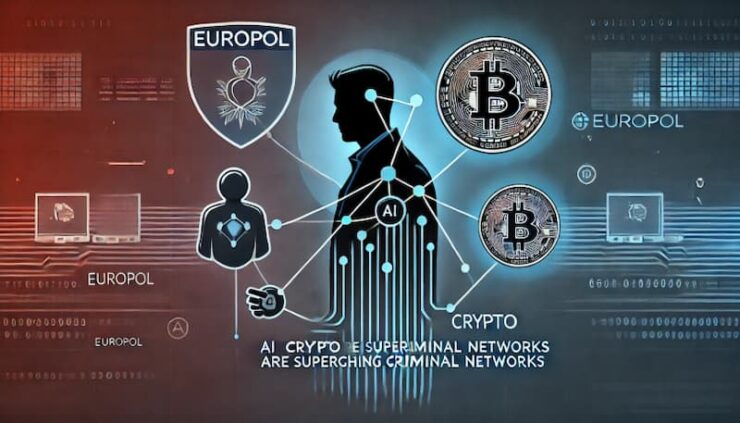Organized crime is evolving at a dangerous pace — and Europol says artificial intelligence and cryptocurrency are giving criminals an unprecedented edge.
The European Union Agency for Law Enforcement Cooperation (Europol) has issued a stark warning: rapid advancements in artificial intelligence (AI) and blockchain-based technologies dramatically increase criminal efficiency.
According to Europol’s latest serious and organized crime threat assessment, tech-savvy criminal groups are adapting faster than regulators and law enforcement can respond.
Europol’s report highlights AI’s growing role in cybercrime, with generative AI tools lowering barriers to entry. Criminals can now craft convincing, multi-language phishing campaigns, clone voices, and produce synthetic videos in minutes — capabilities once limited to highly skilled actors.

“The addition of AI-powered voice cloning and live video deepfakes amplifies the threat, enabling new forms of fraud, extortion, and identity theft,” the agency warned.
These tools allow bad actors to impersonate victims’ loved ones or company executives, increasing the success rate of scams and extortion attempts.
But AI isn’t the only concern. Europol also points to cryptocurrency and NFTs as enablers of crime. While digital assets were once confined to cybercrime, they are now deeply entrenched in traditional criminal activities such as drug trafficking and migrant smuggling.
Criminal organizations also target crypto mining resources, NFTs, and digital wallets, expanding their operations beyond the digital realm.
Blockchain’s promise of anonymity is proving a double-edged sword. Europol noted that cryptocurrencies have become integral to laundering illicit funds — a tactic most recently exposed in the $1.5 billion Bybit hack.
ZachXBT: ‘The Industry Is Cooked’
Crypto investigator ZachXBT, who helped trace the Bybit exploit, described the event as a wake-up call. In a Telegram post, he revealed that the hack exposed deep flaws across decentralized and centralized platforms, stating, “The industry is unbelievably cooked.”
ZachXBT warned that North Korean hackers, like the notorious Lazarus Group, have mastered exploiting weak Know Your Customer (KYC) and Know Your Transaction (KYT) protocols.
In this case, decentralized protocols generated nearly all their monthly revenue from North Korea-linked activity without accountability. Meanwhile, some centralized exchanges responded so slowly to flagged transactions that millions were laundered in minutes.
“These flaws show the limits of current systems,” ZachXBT wrote. “Unless governments step in with stricter regulations, this cycle will repeat.”
A Growing Global Dilemma
Chainalysis echoed these concerns, noting that AI is supercharging scams, making them cheaper, more scalable, and harder to detect. Generative AI now enables the creation of fake identities indistinguishable from actual users — a development that complicates enforcement and verification processes globally.
As law enforcement scrambles to catch up, the convergence of AI and crypto technologies creates new layers of complexity. Europol’s report suggests that without aggressive regulatory action and international cooperation, traditional crime and cybercrime will continue to merge — faster and more efficiently than ever before.
Conclusion
Europol’s findings underscore a looming challenge: technology is outpacing law enforcement. AI and crypto-fueled crime could reshape the global financial and security landscape if left unchecked. Governments now face a critical decision — innovate enforcement or risk falling permanently behind.





